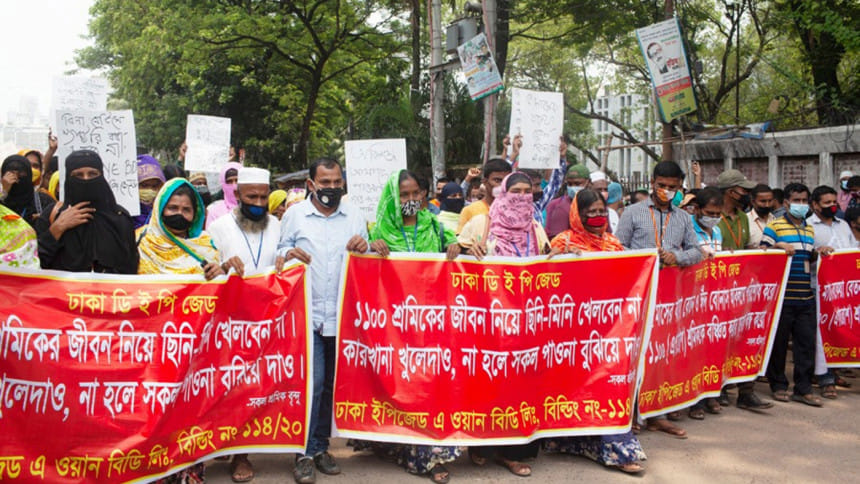Ethical business is not a one-way street

It really warms my cold, judgmental heart when I hear grandiloquent statements from Bangladeshi RMG factory owners about the importance of ethical business as they plead with big global brands to "do the right thing" and "stand by poor Bangladeshi workers". After a decade of reporting and researching on labour rights violations and crackdowns on workers for demanding better wages and work conditions, it is comforting, to say the least, to hear such passionate proclamations of their commitment to the workers who have helped them build million-dollar empires. There's nothing like a pandemic and billions of dollars' worth of cancelled orders to bring the haves and the have-nots under the same banner of "wronged", and for the former to finally realise the folly of prioritising profit over people.
Imagine my disappointment, then, when I hear accounts from workers and labour activists on the ground which suggest otherwise. Even the official statistics do not paint a benevolent picture of the owners' performance. Workers are being dismissed from their jobs on a weekly basis despite repeated calls by the government to not terminate workers during the pandemic and a rather successful #PAYUP Campaign that has managed to shame many of the world's biggest brands into committing to fulfil their obligations to their suppliers. According to the Department of Inspection for Factories and Establishments (DIFE), as of July 10, over 26,110 workers have been dismissed, 14,132 have been laid off, and 1,55,010 workers have been retrenched since the onset of Covid-19. While these statistics are alarming enough, what's even more distressing is that there's no documentation of how many of these workers received full compensation in accordance with the country's labour laws. Labour unions say an overwhelming majority did not receive anything at all or only received a fraction of their owed wages, severance and other dues, and that there's little recourse available for most of them, given the sheer scale of the violations and the limited scope in which courts and unions are operating.
Workers in the industrial belts claim that in many cases factories forced them to resign rather than dismissing them, which robbed them of their termination benefits that could have helped them tide through the depressed economy for at least a couple of months. In March-April, factories by and large forced workers with less than a year of experience to resign, paying them only the running months' salary. In June and July, factories overwhelmingly targeted pregnant workers, according to labour activists and media reports. I spoke to 20 women from 12 different factories over the past month who have either been dismissed or forced to resign, without payment of their maternity benefit or any other dues. Some of these women were told to stay home during the lockdown by their respective factory management—"for their own safety"—but were subsequently dismissed for missing work when they eventually reported to their workstations after Eid. Yet others were let go because they fell sick, made a minor mistake or failed to meet their production targets. Some of these women say they are afraid to raise the issue with the authorities or file a case as their husbands also work in the same factory and they can't afford for both to lose their job.
Even for those lucky enough to still have jobs, work conditions have deteriorated drastically since the onset of the pandemic. Rukhsana, who works at a factory in Ashulia that sources for Bestseller, Next and Matalan (according to a database of the Bangladesh Garment Manufacturers and Owners' Association shared with The Daily Star in May), says that she has been working 12-13 hour shifts every day since her factory reopened in May and is having to meet production quotas that are 30-40 percent higher than their usual targets.
"There were 22 lines in my floor—now there are 13. We have to finish our own targets as well as that of the closed lines. I keep my head down since I still have a job and try to finish my work, but it's impossible to meet the targets that they are setting," she says. "First, they got rid of the helpers, who would help us cut the threads. Then, they increased our targets from 100 pieces per hour to 120 pieces, then 130 pieces, now they are asking us to make 150 pieces! I work through lunch every day, I don't drink water lest I have to go to the bathroom, and stay back late even after our shift is over—how can I possibly do more? My whole body is in pain, I don't get any strength in my hands… and when I go back home, even the sight of my child makes me angry and depressed because I have to cook for and tend to him."
As per the law, RMG workers can work a maximum of two hours' overtime a day, with the average workweek not exceeding 56 hours. But Rukhsana's week these days consists of 70-80 hours of work. Worse still, she is not being paid any overtime for this extra work. "I was so tired and sick one day that I said I can't do extra work today, and my supervisor threatened to fire me without giving me a penny of what I'm owed. I've worked here for 10 years. Do I have any right to protest this injustice? I am supposed to be grateful to have a job. It's like all considerations of our rights have gone out of the window. Anything goes now."
The pandemic seems to have provided a blanket opportunity to weed out those considered "troublemakers" by factory management—union leaders, members and general workers who vocalise concerns about violations. Union busting and harassment and retaliation against dissenting workers have been part of a long, inglorious tradition in the RMG sector—now, with the threat of unemployment looming over their heads, union activists are more vulnerable than ever and are being targeted even if and when they stay silent. Ordinarily, many of these unions would resort to the Accord on Fire and Building Safety in Bangladesh, which had a provision to protect workers from retaliation for raising health and safety concerns, write directly to the brands or file cases with the labour courts. But with the Accord no longer in Bangladesh, the brands embroiled in their own set of violations, and the labour courts delayed indefinitely due to the pandemic, there's very little recourse left for workers who are wrongfully terminated or targeted because of their affiliations with unions.
To make matters worse, at least eight factories I know of have filed cases against hundreds of named and unnamed workers who are taking to the streets to protest months of non-payment of wages and benefits. I don't yet know the details of these cases to claim that workers were falsely charged. But even if, for argument's sake, the workers did resort to violence, as I am sure the factory management would have us believe, could we really blame them for their increasing desperation when their pleas during these incredibly trying times have been met with silence at best, and police violence at worst?
Asraf Ali, for one, has been patiently and peacefully protesting since March, but he still doesn't know when, if ever, he'll receive his due wages, severance pay and share of provident fund. After staging multiple protests at the height of the lockdown, he and his colleagues were informed by BEPZA in April that their factory, A-One BD Ltd, had gone out of business and that they would be paid once the sale was completed within a couple of months. Since then, they've pleaded with the authorities on numerous occasions to speed up the process of clearing their dues, but BEPZA is now insisting it will take another six months to a year for the sale to be completed and that the factory is in too much debt anyway for the workers to get their full payment.
"We haven't been paid for seven months. They gave most of us Tk 20,000 each before last Eid, and said it would have to last us till the sale goes through. But I owed my landlord rent from January, and I had been buying groceries on credit, so the money was spent within hours. Every day, more and more people are being dismissed from the EPZ factories, many without any benefits. Where and how will I find a job now?"
Workers of 1,175 RMG factories have not received their June wages as of July 19, according to industrial police data, and there are grave uncertainties over whether they will be paid their salaries and bonuses ahead of Eid. The industrial police fear that 790 factories may fail to pay wages and bonuses before Eid. The government has urged the factories to pay festival bonuses by July 27 and half of their current month's salary in advance by July 30, but without any enforcement mechanism on the authorities' part, and no assurances about those who are yet to be paid severance, the workers have no choice but to hope for an Eid miracle: that good sense and humanity prevail at the end of the day.
Let's put our money where our mouth is. Hypocrisy is not a good colour on any one, not least our garment owners.
Sushmita S Preetha is a journalist and researcher.

 For all latest news, follow The Daily Star's Google News channel.
For all latest news, follow The Daily Star's Google News channel. 



Comments